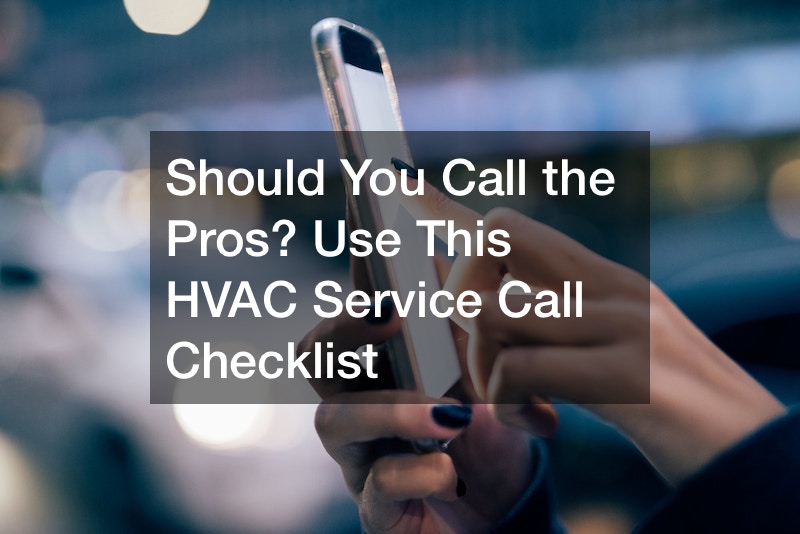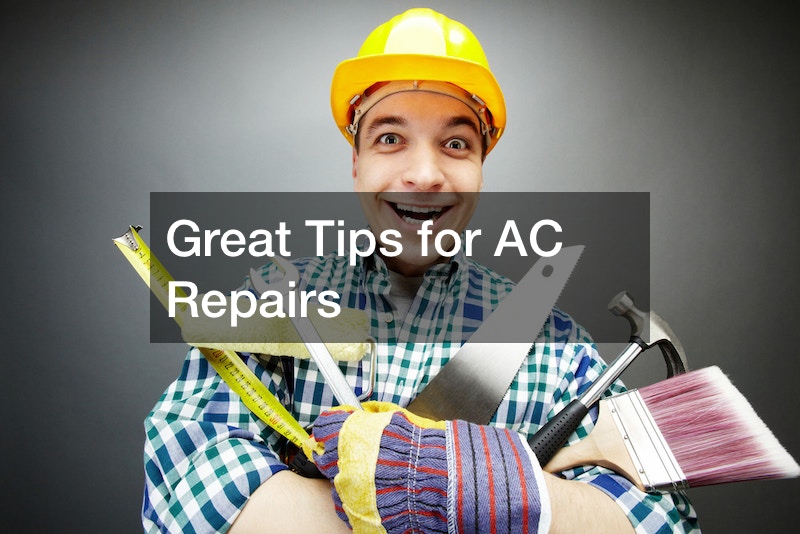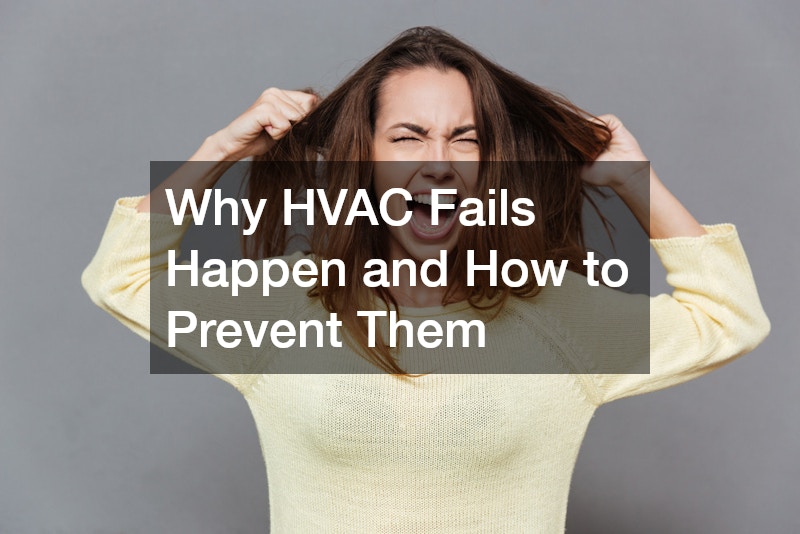Perhaps your HVAC system started making a funny noise when it kicked on. Maybe you noticed a little puddle of water outside the heat pump. Does the HVAC system seem to blow less cold or hot than usual? How do you know which items you could address yourself and which problems mean you need to contact a professional certified HVAC repairperson?
This HVAC service call checklist notes the problems that indicate you need to hire a professional HVAC contractor. We make it simple. If it appears on this list, phone or email an HVAC service company. If you don’t read it here, you can probably fix it yourself.
1. The Air Conditioning or Heater Stops Working
When you flick the switch on the thermostat to turn on the AC or heat, the system should begin blowing appropriate air within a minute or two. If it does not turn on, check the thermostat’s batteries. If replacing the batteries does not fix the problem, check the breaker box. If resetting the breakers does not work, phone heating and cooling professionals in your area to examine and repair the HVAC system.

2. The Air Conditioner Blows Warm Air
Check the thermostat settings. Sometimes, an accidental change to the settings causes this problem. Set the system to the cooling setting and adjust the temperature to 70 degrees Fahrenheit.
If that does not fix the issue, then check the air filter. If you replaced the filter within the last 30 days, it should still appear white, not gray. A gray filter indicates a need for a new air filter. Change it and try the air conditioning again.
If the replacement air filter did not solve the problem, phone your local heating and air service because you found an item on the HVAC service call checklist that requires their services. In many cases, the AC ran low on refrigerant, which HVAC professionals can replace. In other situations, the problem with the AC unit lies elsewhere and an HVAC service professional can find it and address it.
3. You Find a Leak in the AC Unit
Any leak you spot or suspect indicates a need to phone a local AC contractor. This entry on the HVAC service call checklist happens with some regularity overall, but finding frequent leaks in the AC unit in your home means you need a new AC unit. Condensation also presents itself with any HVAC occasionally, however, if you notice frequent condensation on the AC unit, call an HVAC professional service provider. The typical cause of this issue – a clogged condensate line – requires an HVAC professional to repair it.
4. Loud Noises Emit from the AC or Heater Unit
Besides the tiny vroom and whoosh of that first warm or cool air, you should not notice noises from the HVAC system. The “subdued buzz” that an HVAC system makes as it blows out air indicates normal performance. Other noises signal a problem with the heating and cooling system and may include:
-
- Screeching
-
- Squealing
-
- Rattling
Each of these sounds means you need to contact heat and air conditioning repair professionals because this entry on the HVAC service call checklist means the system developed mechanical problems.
The screech or squeal typically indicates a problem with an internal belt. Rattles come from inappropriately functioning compressors, fans, or motors. None of these problems prove appropriate for a do-it-yourself fix.
Less common sounds mean more serious problems. A loud banging coming from your HVAC, such as a pop or thump when the system starts, indicates settling ducts. Improperly installed or under-insulated ductwork does this when it becomes colder or warmer. While some sources refer to this as harmless, the lack of insulation impedes energy efficiency and can cost you more money, so have an HVAC professional reinstall the ducts or insulate them properly.
A variable clanking or flapping that slows, then speeds up, means your HVAC system has debris stuck in it. It could be a bent fan blade, food wrappers that the air vents sucked in, or leaves in the system. Have an HVAC professional clean the ducts, ventilation system, and the area around the fan blade.
The sound of metal grinding against metal indicates an HVAC emergency. Shut down the HVAC system completely and phone an emergency HVAC repair service professional. The two metal pieces grinding against one another can cause sparks and, thereby, a house fire. If you hear this sound, shut off the HVAC immediately and use either a portable AC unit to keep cool in spring and summer or a space heater to keep warm in fall and winter.
Noticing a rumbling noise from the furnace also signals a need to contact an HVAC professional. A rumbling sound from a furnace means it can’t properly light. Try resetting the pilot light according to the directions on the unit or in the owner’s manual. If that does not address the problem, email or phone an HVAC professional, who will inspect, clean, and either repair or replace the igniter.

5. Low or No Airflow through Vents
Sometimes, you notice that air doesn’t flow through some vents. Other times, no vent seems to emit air. In most cases, blocked vents indicate a need for a new air filter and duct cleaning. While it might sound simple to clean ducts, this belongs on the HVAC service call checklist because you cannot effectively clean air ducts using a household vacuum cleaner.
An HVAC professional uses professional-grade vacuums attached to a truck that collects the debris, dirt, and dust removed from the system. These vacuum hoses let the air duct cleaning company reach deep into the ducts to completely eradicate the blockages. This in-depth cleaning results in a better functioning system and can help alleviate poor indoor air quality.
6. Odors Emit from the Vents or the HVAC Unit
Similarly, an odor emitting from the HVAC system or the ducts indicates an issue with the ventilation system or ducts. If the system smells musty when it operates, call in HVAC repair professionals to clean the ducts. However, if you smell something burning, components in the system may have overheated or shorted out. Remain safe by turning off the HVAC system and calling for emergency repairs for this item on the HVAC service call checklist.
7. When the Thermostat Malfunctions
Thermostats eventually go bad. When they do, it’s best to replace them with a smart thermostat. These new designs offer improved functions and an array of features. Before phoning an HVAC service professional, check the thermostat’s settings and check the batteries in the thermostat, replacing them if they have no or low charge.
Every HVAC system needs a functional thermostat to operate correctly. Without a functional thermostat, the unit can not turn on and off. Because thermostats cost $100 or less, your HVAC professional typically recommends that you replace the broken thermostat with a new one, since that costs less than parts and labor to repair a broken one.

8. The HVAC System Blows at Inconsistent Temperatures
When the heat and air conditioning system blows at varying temps but the setting on the thermostat has not wavered, it indicates one of two problems, both of which require an HVAC service call from a professional repair person. The service personnel’s examination typically results in either a diagnosis of a broken thermostat or insufficient insulation.
The replacement of the broken thermostat remains the purview of the HVAC technician, but if the home’s insulation proves the root of the problem, that requires a separate contractor. Repairing that issue requires an insulation contractor that specializes in either blown in insulation or roll insulation. In this case, addressing the situation may require more than an HVAC service call checklist option.
The Energy Bill Costs Remarkably More Than Usual
Comparing this year’s energy bills to the prior year’s can help you spot HVAC repair needs. Barring an increase in fuel costs, your home’s energy bills should remain close to the same in cost year-to-year. A spike in costs indicates the HVAC unit ceased efficiently operating. It may have clogged air ducts or the system’s internal blower fan may require lubrication. Phone or email your local HVAC professional to set up a service call.
Repairing the situation may require professional air duct cleaning. The air duct examination may reveal rusted or corroded ducts, necessitating the installation of new ducts. The simpler cause of this issue only requires adding lubricant to the outdoor portion of the system.
10. The HVAC System Cycles On and Off Constantly
We already covered what to do when your home’s HVAC system turns off completely or won’t boot up. Another problem on the HVAC service call checklist relates to constantly cycling HVAC systems. Contact a professional HVAC repair person because this issue indicates that either the system became overloaded or the home developed electrical wiring issues. Let’s delve a little more deeply into these two issues.
An overworked HVAC system operated without energy efficiency. It causes excessive wear and tear on the system’s components. Note whether the cycling begins when other high-energy appliances operate. If it does, this points to electrical wiring problems in the home and requires a professional, certified electrician to repair.
Constant cycling on and off can also indicate corroded wires and terminals. A professional HVAC technician can inspect the system, identify the corroded parts, and replace them. Leaving the problem unaddressed creates a larger problem because on-off system cycles quickly wear out the compressor and the fan.

Prevention of Potential Problems
The old adage, “An ounce of prevention is worth a pound of cure.”, rings true. Avoid some items that could appear on an HVAC service call checklist of issues by properly providing your HVAC system with the right maintenance. This begins when you purchase your home or your HVAC system.
Start by having your HVAC installers add HVAC corrosion protection to your new unit. They do this by treating the coils on the heat and air conditioning system with HVAC Coil Coating, also referred to as Round Tube Plate Fin (RTPF) heat exchanger coating. This type of coating protects the coils from corrosion by sealing the heat exchanger from the rest of the system and the outside environment. These sealants protect the coils without adversely affecting heat transfer or causing a pressure drop.
While a home’s roof needs an annual inspection from roof repair services professionals, so does an HVAC system. An yearly inspection and maintenance visit can spot developing problems on an HVAC service call checklist and address them in their infant stages. Solving the problem early on eliminates larger problems later.
Also, schedule annual maintenance for related, but separate systems, such as the building’s water heaters. In some older systems, a boiler connects to both systems, so a problem with one can cause a problem with the other. Avoid costly issues by scheduling yearly maintenance on all major appliances and systems.
Some homeowners reduce the cost of annual maintenance by purchasing a home maintenance plan that covers multiple years of service. This lets them lock in a lower price and avoid inflationary price increases for a few years. If local providers don’t offer this option, contact your local HVAC contractor to purchase an HVAC-only maintenance plan.
Addressing Problems Appearing on an HVAC Service Call Checklist
Unfortunately, most HVAC issues require a professional repair person to address them. Their expertise, licensing, and certifications can salvage a broken system or replace it with a much more efficient system that can help reduce your monthly energy costs. Contacting a professional HVAC service company can save you time and money because they will honestly appraise the situation and offer the best solution.
Most damage to HVAC systems stems from wear and tear, so home insurance does not cover it. Even though you won’t need more than one repair estimate for an insurance claim, obtain at least two or three repair quotes. This ensures that the initial diagnostic tests uncovered the real issue and that you chose the proper tactic to solve the problem.



